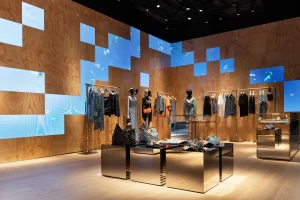
Video games and movies are two of the most influential forms of entertainment in modern culture, and over the years, these industries have shaped one another in profound ways. From shared technological advancements to story adaptations, the lines between gaming and film have blurred, creating a symbiotic relationship that continues to evolve. This article will explore how video games and movies have influenced each other and the role they play in shaping popular culture.
How Video Games Have Revolutionized Entertainment
Video games have come a long way since their early days of pixelated graphics and simple mechanics. Today, they are a multi-billion-dollar industry that rivals the film and music industries. The evolution of gaming has had a significant impact on modern entertainment in various ways:
- Narrative Complexity: Video games have introduced complex storytelling, with many games offering deep narratives and character development. Titles like The Last of Us and Red Dead Redemption 2 are examples of games that rival cinematic storytelling in both quality and emotional depth. This shift has influenced movies by raising audience expectations for story-driven experiences.
- Immersive Experiences: Games have pioneered immersive experiences through virtual reality (VR), augmented reality (AR), and open-world designs, providing players with unparalleled engagement.
- Cultural Phenomenon: Gaming has become a central part of global popular culture, with massive communities forming around franchises like Fortnite and Pokémon. Just like movies, games have become vehicles for social interaction, with players forming connections and creating shared experiences that are often reflected in the wider cultural landscape.
Gaming and Film: A Symbiotic Relationship
The relationship between video games and movies is one of mutual influence. These two industries have long borrowed from each other, with both forms of entertainment often drawing inspiration from the other.
- Video Game Adaptations into Movies: Over the years, video game storylines have been adapted into blockbuster films. Franchises like Resident Evil, Tomb Raider, and Assassin’s Creed have all made the leap from console to cinema, often blending game lore with cinematic storytelling. These adaptations bring video games to a broader audience, but they also provide new opportunities for creative storytelling, expanding the reach of gaming franchises.
- Movies Inspiring Video Games: Conversely, movies have also inspired video game development. Titles like Star Wars: Knights of the Old Republic and The Matrix Online were influenced by their respective film franchises. The success of The Lord of the Rings films spurred the development of several action-adventure games that allowed players to explore the rich worlds depicted in the films. These games often enhance the movie-going experience, offering fans a deeper dive into their favorite universes.
This reciprocal borrowing of ideas and stories has helped elevate both industries, creating a continuous loop of inspiration and adaptation. It’s no surprise that the lines between video game fans and moviegoers have become increasingly blurred.
Technological Advancements in Gaming and Cinematography
Technology plays a significant role in both the gaming and film industries, with both sectors constantly pushing the boundaries of visual and auditory experiences. Advancements in technology have allowed both mediums to create increasingly realistic and immersive environments.

- Visual Effects (VFX): In both games and films, visual effects have evolved to create lifelike environments and characters. Motion capture technology, first used in gaming, is now widely used in film production. Games like The Witcher 3 and movies like Avatar use similar technologies to create detailed characters and worlds, offering an unparalleled level of realism.
- Virtual Reality and Augmented Reality: VR and AR technologies have been explored in both gaming and film. While gaming has led the way with immersive VR experiences, filmmakers are now experimenting with VR to create interactive, story-driven experiences. These technologies are redefining how stories are told, providing new possibilities for audience engagement.
In both the gaming and film industries, technological advancements continue to reshape the way we experience entertainment, making the boundary between the two even more fluid.
The Cultural Impact of Gaming and Movies
Both video games and movies have had a profound impact on society, influencing everything from fashion trends to social behavior. The influence of these forms of entertainment can be seen in popular culture, where iconic characters, quotes, and moments have become part of the cultural lexicon.
- Shaping Modern Narratives: Video games and movies have played a key role in shaping modern storytelling. Both have explored complex themes such as morality, identity, and social issues. Movies like The Matrix and Inception have influenced video game narratives, while games like BioShock and The Walking Dead have tackled themes often seen in films, sparking important cultural conversations.
- Merchandising and Cross-Media Integration: Merchandising and cross-media collaboration have been significant in both industries. The success of movies often leads to video game adaptations, and vice versa. Additionally, both gaming and film franchises now extend into comic books, television shows, and novels, creating a multimedia ecosystem that keeps fans engaged across various platforms.
The Future of Storytelling in Gaming and Film
Looking ahead, the future of storytelling in both gaming and film seems more interconnected than ever before. As technology continues to evolve, we may see new ways of blending the two mediums:
- Interactive Storytelling: Games are already exploring interactive storytelling, with titles like Detroit: Become Human allowing players to make choices that impact the narrative. This could influence films as well, with directors experimenting with interactive movies, where viewers make decisions that shape the story, much like interactive game narratives.
- Virtual Worlds and Immersive Experiences: Virtual worlds, powered by VR and AR, could become the next frontier for both gaming and film. Imagine a movie where you can physically explore the environment or a game where the story is delivered in a cinematic experience. The possibilities for storytelling are endless, and both industries will likely push each other to new heights.








